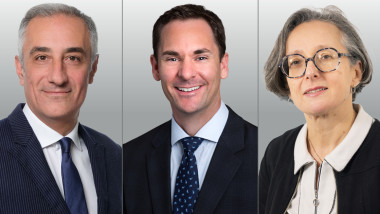Financial Professionals Focus on Human Dynamics in Response to Growing Digital Competition
Robo-advisors. Industry disruptors. Enhanced do-it-yourself tools. How can financial professionals differentiate themselves in an increasingly digital world?
Counterintuitively, many say that improving the human dimensions of their practice may be the key to standing out as the world becomes more automated. They say that competing in the digital age means they’ll need to focus more and more on client relationships and communication. And they know in order to succeed, they’ll need to continue to adapt and evolve.
Our recent Global Survey of Financial Professionals sheds light on how they plan to navigate their biggest challenges and make stronger client connections by enhancing their soft skills.
The competitive landscape is changing. Dramatically.
In response to their rapidly changing industry, many financial professionals are reevaluating what their business might look like in the next five years.
| Now | In five years | |
| Traditional financial professionals |
69%
|
31%
|
| Automated advice platforms |
14%
|
24%
|
| Improved tools for self-directed investors |
8%
|
23%
|
| Industry disruptors |
7%
|
21%
|
- Integrating digital services (68%)
- Increased fee pressures (62%)
- Greater client demand for passive investments (41%)
That means they’ll need to be one part investment expert—and one part business manager. Especially since 3/4 believe that the real route to business growth will be found in winning new client assets.
How will financial professionals respond to growing business pressure?
- 45% Drop lower balance clients from their book of business
- 20% Adopt third-party portfolio models
- 18% Add an automated advice front end to their service model
- 12% Find strength in numbers and merge with another firm
- 11% Leave the advice business altogether
Soft skills may help financial professionals stand out
- 7 in 10 advisors say they need to develop client communication skills
- 8 in 10 describe their role as guiding clients through the emotional side of investing
- Fewer than 20% forsee losing clients based on industry disruption or the quality of digital advice
What role do financial professionals play with clients?
| Guide clients through emotional side of investing |
78%
|
| Provide ongoing education |
68%
|
| Guidance on identifying and achieving life goals |
64%
|
| Help navigating life events |
57%
|
| Help with family-related affairs |
41%
|
Top reasons financial professionals lose clients
- 70% not communicating frequently enough
- 56% not listening to client needs
- 53% failing to demonstrate value beyond asset allocation
Financial professionals can find many opportunities to put these new soft skills into action as they look to enhance the service experience for clients. For example:
- Risk needs to be seen in more personal terms
- Estate planning needs to go beyond just the will
- Investing in values with ESG (Environmental, Social & Governance) investments will become more important
Read the full report
Learn more about how financial professionals are differentiating themselves in an increasingly digital world.
About the survey
Natixis Investment Managers Global Survey of Financial Professionals, conducted by CoreData Research in March 2018. Survey included 2,775 financial professionals in 16 countries with the aim of better understanding the perspectives, challenges, and needs of this key collective of individuals to the financial services industry.
All investing involves risk, including the risk of loss. No investment strategy or risk management technique can guarantee return or eliminate risk in all market environments.
The views and opinions expressed may change based on market and other conditions. This material is provided for informational purposes only and should not be construed as investment advice. There can be no assurance that developments will transpire as forecasted. Actual results may vary.
Sustainable investing focuses on investments in companies that relate to certain sustainable development themes and demonstrate adherence to environmental, social and governance (ESG) practices; therefore the universe of investments may be limited and investors may not be able to take advantage of the same opportunities or market trends as investors that do not use such criteria. This could have a negative impact on an investor's overall performance depending on whether such investments are in or out of favor.
The data shown represents the opinion of those surveyed, and may change based on market and other conditions. It should not be construed as investment advice.
Natixis Distribution, L.P. is a limited purpose broker-dealer and the distributor of various registered investment companies for which advisory services are provided by affiliates of Natixis Investment Managers.
2404623.1.1




 Equities: How worried should we be about valuations?
Equities: How worried should we be about valuations?
 2024 Fund Selector Outlook
2024 Fund Selector Outlook
 2024 Institutional Outlook
2024 Institutional Outlook
 Seven Insights on How the Smart Money Is Approaching ESG
Seven Insights on How the Smart Money Is Approaching ESG